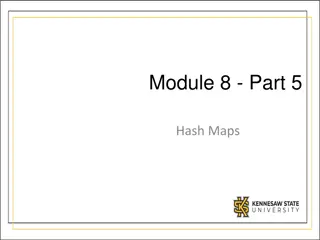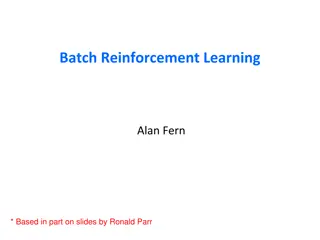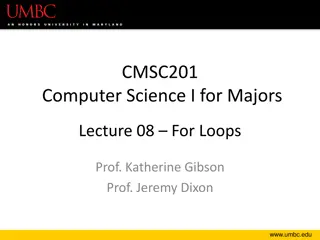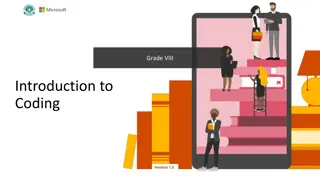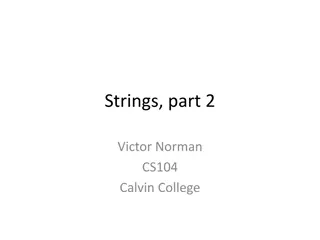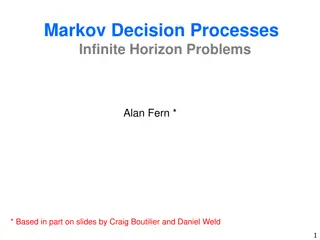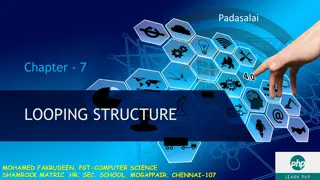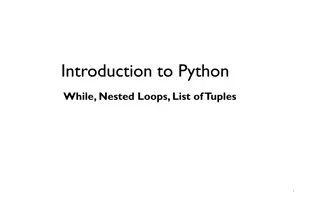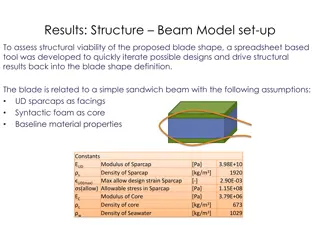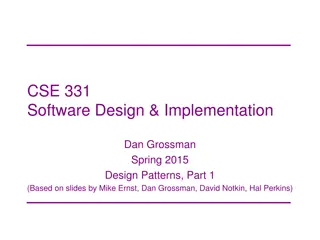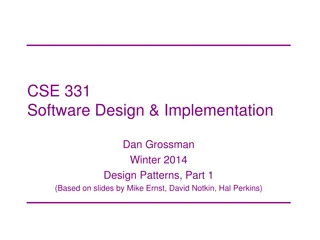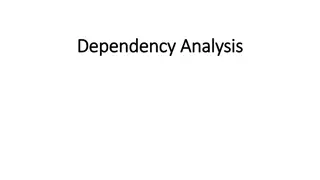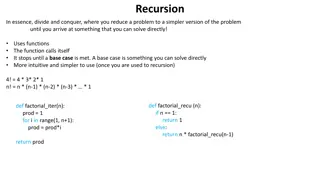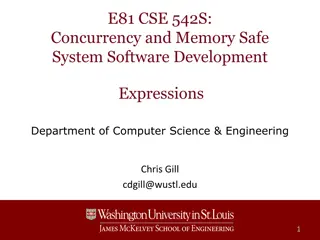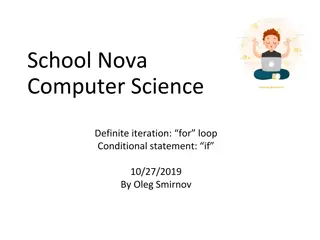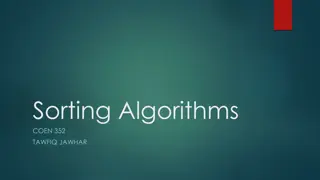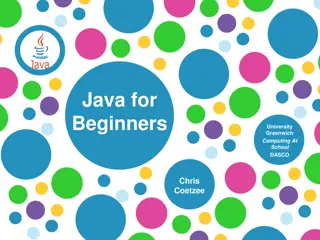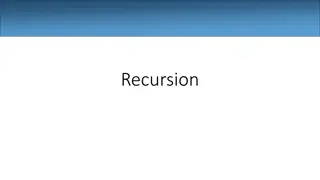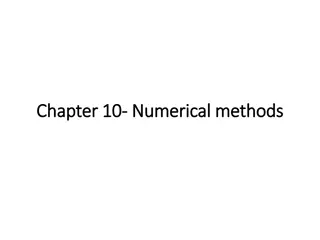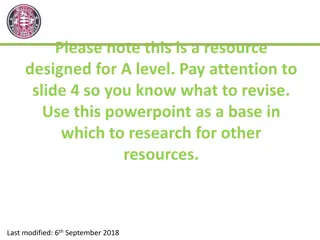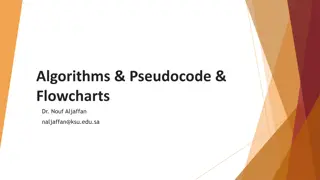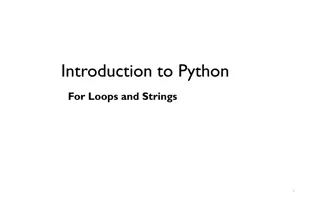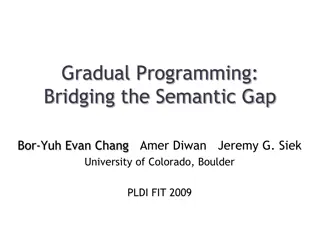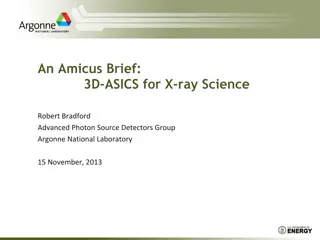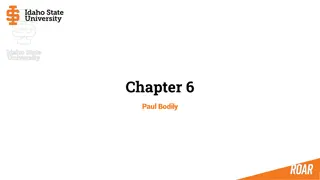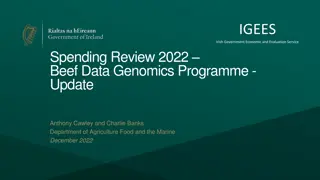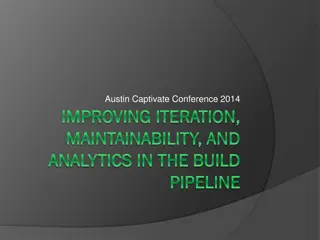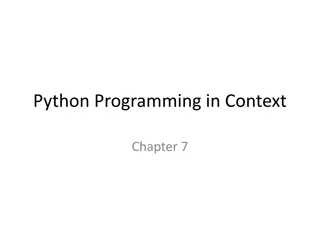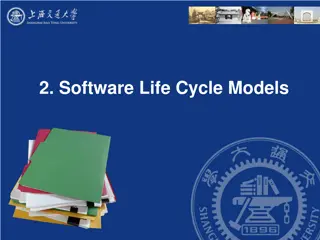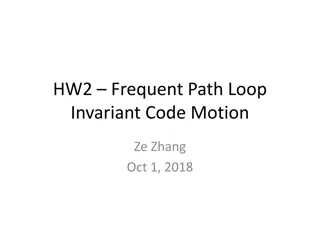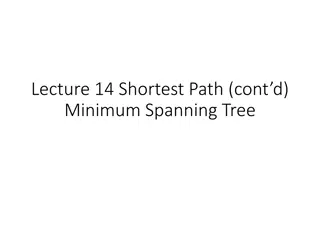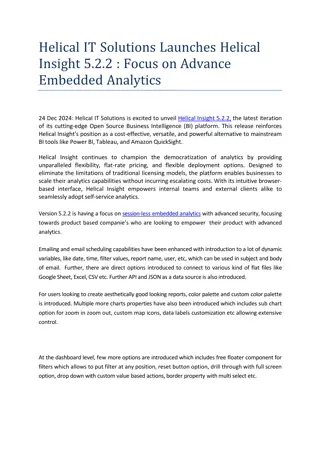Hash Maps: A Common Data Structure
In this module, learn about Hash Maps, a common data structure used in various programming languages like Java, C#, C++, Python, and PHP. Hash Maps allow you to store key-value pairs without duplicate keys, making it efficient for mapping relationships between data elements. Explore how to declare,
6 views • 16 slides
Helical IT Solutions Unveils Helical Insight 5.2 (2)
Helical IT Solutions proudly announces the launch of Helical Insight version 5.2, the latest iteration of its acclaimed Open Source Business Intelligence (BI) platform. This release marks a significant milestone in empowering enterprises with a versatile and cost-effective BI solution, poised to rev
1 views • 2 slides
Batch Reinforcement Learning: Overview and Applications
Batch reinforcement learning decouples data collection and optimization, making it data-efficient and stable. It is contrasted with online reinforcement learning, highlighting the benefits of using a fixed set of experience to optimize policies. Applications of batch RL include medical treatment opt
2 views • 47 slides
Roots of Equations in Engineering: Methods and Techniques
Roots of equations are values of x where f(x) = 0. This chapter explores various techniques to find roots, such as graphical methods, bisection method, false position method, fixed-point iteration, Newton-Raphson method, and secant method. Graphical techniques provide rough estimates, while numerica
0 views • 13 slides
For Loops in Python: A Comprehensive Overview
This content delves into for loops in Python, covering their syntax, practical applications, and differences from while loops. It explores how for loops can iterate over lists and perform actions a set number of times. Learn about the range() function and updating programs using for loops. Additiona
2 views • 47 slides
Insights on Future Wireless Standards Development
Delve into the progression of IEEE 802.11 standards with a focus on the transition from 802.11be to the next generation. Discussions revolve around the evolution of PHY/MAC task groups, motivations for the new generation, and potential enhancements in system efficiency, latency, throughput, and spec
0 views • 8 slides
Introduction to Coding Ethics and Control Structures
Explore the fundamental concepts of coding ethics, including respect for privacy and confidentiality. Dive into control structures in programming, such as conditionals, logical operators, and relational operators. Gain insights into different types of control structures like sequential, selection/co
0 views • 44 slides
Evolution of Bicycle Designs Over the Centuries
Explore the fascinating evolution of bicycles from the early "Walking Machine" and "Bone Shaker" to the iconic "Penny Farthing" and the revolutionary "Safety Bicycle". Witness the transition from uncomfortable and impractical designs to the safer and more efficient models that laid the foundation fo
1 views • 8 slides
Item-Based vs Index-Based Iteration in Programming
Exploring the differences between item-based and index-based iteration methods in programming, this content delves into the syntax, readability, and when to use each approach. It provides examples and scenarios to illustrate the use of these iteration methods and discusses the accumulator pattern an
0 views • 17 slides
Infinite Horizon Markov Decision Processes
In the realm of Markov Decision Processes (MDPs), tackling infinite horizon problems involves defining value functions, introducing discount factors, and guaranteeing the existence of optimal policies. Computational challenges like policy evaluation and optimization are addressed through algorithms
2 views • 39 slides
Introduction to Markov Decision Processes and Optimal Policies
Explore the world of Markov Decision Processes (MDPs) and optimal policies in Machine Learning. Uncover the concepts of states, actions, transition functions, rewards, and policies. Learn about the significance of Markov property in MDPs, Andrey Markov's contribution, and how to find optimal policie
0 views • 59 slides
Looping Structures in PHP
Looping structures are essential in programming for writing iteration logics. This article delves into the importance of looping structures, different types in PHP, and creating basic logic using loops like for, while, for each, and do-while. Learn the syntax, parameters, examples, and flow charts t
0 views • 23 slides
Python Loops: While, Nested Loops, and List of Tuples
Python loops come in two types - definite loops (like for loops) and indefinite loops (like while loops). While loops are used for conditional iteration, repeating as long as a condition is true. On the other hand, for loops are ideal for situations where the number of iterations is known in advance
1 views • 25 slides
Structural Assessment and Blade Design Iteration Tool Development
A spreadsheet tool was created to assess the structural viability of a proposed blade shape, incorporating a sandwich beam model with UD sparcaps and syntactic foam core. Validation of the beam model against FEA results was conducted, highlighting the relationship between beam thickness, spar width,
0 views • 10 slides
Introduction to Software Design Patterns in CSE 331 Spring 2015
Dive into the world of design patterns with a focus on creational patterns, structural patterns, and behavioral patterns in the context of software design and implementation. Explore concepts like encapsulation, subclassing, and iteration along with their problems, solutions, advantages, and disadva
0 views • 48 slides
Software Design Patterns in CSE 331 Winter 2014
Explore the concept of design patterns in software development, including creational, structural, and behavioral patterns. Learn about encapsulation, subclassing, and iteration with examples and their solutions and disadvantages.
0 views • 46 slides
Data Dependencies in Nested Loops
Studying data dependencies in nested loops is crucial for optimizing code performance. The analysis involves assessing dependencies across loop iterations, iteration numbers, iteration vectors, and loop nests. Dependencies in loop nests are determined by iteration vectors, memory accesses, and write
0 views • 15 slides
Recursion in Computer Science
Recursion is a powerful concept in computer science that involves breaking down a problem into smaller, more manageable parts until a base case is reached and solved directly. By utilizing functions that call themselves, recursion offers an elegant way to solve complex problems. This post delves int
0 views • 13 slides
Rust Expressions and Declarations in System Software Development
Rust is an expression language where most things have values. Learn about Rust expressions, blocks, declarations, conditional expressions, multi-case expressions, and iteration expressions in system software development. Explore the execution semantics, syntax, and best practices for writing safe an
0 views • 8 slides
Definite Iteration in Computer Science
Definite iteration in computer science involves using for loops and conditional statements to execute a set of instructions a specific number of times. This concept is demonstrated through examples and exercises such as iterating through a range of numbers, calculating sums and products, and underst
0 views • 11 slides
Bubble Sort Algorithm - COEN 352 by Tawfiq Jawhar
Dive into the world of sorting algorithms with a focus on Bubble Sort. Explore how Bubble Sort works through animations, visual representations, and explanations of its time complexity, stability, and in-place nature. Discover the significance of one iteration in Bubble Sort and how it affects the a
0 views • 17 slides
Learning the Basics of Java Programming through Visual Guides
Explore the fundamentals of Java programming step by step with visual aids covering syntax, variables, loops, logic operators, iteration, and more. Understand essential concepts such as conditional statements, iteration types, and logic checks in Java.
0 views • 22 slides
ECURE: Course-based Undergraduate Research Experiences Framework
ECURE is an initiative funded by the National Science Foundation, aimed at enhancing undergraduate STEM education through Expanded Course-based Undergraduate Research Experiences. The framework includes essential elements of authentic research, emphasizing collaboration, iteration, and discovery. De
0 views • 17 slides
Exploring the Power of Recursion in Programming
Understanding recursion is essential for solving complex problems efficiently in programming. Recursion involves breaking down a big problem into smaller instances of the same problem, leading to elegant and concise code. By learning recursion, programmers gain a different perspective on problem-sol
0 views • 36 slides
Numerical Methods for Root Finding and Iteration
Explore the concepts of root finding, locating roots, stationary points, and iteration in numerical methods. Learn to determine roots, stationary points, and convergence/divergence types, as well as apply the Newton-Raphson method for function approximation.
0 views • 17 slides
Numerical Methods in Mathematics
Explore the world of numerical methods in mathematics, focusing on the Newton-Raphson Method and root approximations. Discover how to locate roots of equations and use iteration to enhance your problem-solving skills. Uncover the significance of numerical methods in finding solutions to complex equa
0 views • 28 slides
Algorithms, Pseudocode, and Flowcharts in Programming
Learn the fundamental concepts of algorithms, pseudocode, and flowcharts in programming through a series of detailed explanations and visual representations provided by Dr. Nouf Aljaffan. Explore the stages in program development, creating algorithms, computational thinking principles, and the pract
1 views • 20 slides
Introduction to For Loops and Strings in Python
Learn about for loops and strings in Python, including how iteration works in algorithms, the concept of for loops, iterating over sequences, using range() function, and examples of for each loops. Master the basics of Python programming with practical examples.
0 views • 32 slides
Bridging the Semantic Gap in Gradual Programming
Observing a disconnect between programmer intent and program meaning, Gradual Programming by Bor-Yuh Evan Chang, Amer Diwan, and Jeremy G. Siek explores tools' lack of knowledge in understanding programmers' priorities, hindering productivity and reliability. Through examples like iteration orders a
0 views • 8 slides
A.mini.TRACS Program Execution
Explore the program execution of a.mini.TRACS through step-by-step analysis, including variable values and output at each stage. Witness how the program progresses and learn the sequence of statements executed. Follow the journey of the counter variable and discover what is printed at each iteration
0 views • 16 slides
Revolutionizing X-Ray Science with 3D-ASICS: A Breakthrough Advancement
Cutting-edge advancements in X-ray science are showcased through the development of 3D-ASICS technology for detectors at the Advanced Photon Source in Argonne National Laboratory. With a diverse user community spanning various scientific disciplines, the need for enhanced detector capabilities is im
0 views • 6 slides
Enhancing Programming Skills: Iteration and Problem Solving in CS Course
Central concepts of iteration and problem-solving techniques in a Computer Science course are explored and valued by students in Chapter 6. Feedback highlights the effectiveness of TA support, engaging teaching methods, and practical exercises. Suggestions for improvement include better alignment of
0 views • 12 slides
Update on Irish Government's Beef Data Genomics Programme
The spending review for 2022 provides key findings and recommendations on the Beef Data Genomics Programme in Ireland. The analysis shows positive trends in genetic gain, with recommendations for a new iteration focusing on data-driven schemes and holistic approaches to improve sector sustainability
0 views • 4 slides
Improving Build Pipeline Speed and Efficiency for Large C/C++ Projects
This discussion focuses on enhancing iteration speed, maintainability, and analytics in the build pipeline for C and C++ projects, addressing common challenges such as slow compilation, inefficient build processes, and tool limitations. Techniques like CSBuild and existing solutions like Incredibuil
0 views • 73 slides
Python Data Mining and Cluster Analysis in Context
This chapter delves into using Python lists for data storage, implementing data mining applications, and exploring cluster analysis. Learn about clusters, centroids, Euclidean distance, visualization, and how to write functions for data analysis. The concepts of indefinite iteration and loop control
0 views • 27 slides
Loop Invariant Code Motion in Frequent Paths for Optimization
Loop Invariant Code Motion (LICM) is a key optimization technique that identifies and moves code operations whose operands remain constant within a loop to improve performance. The process involves careful consideration of memory operations and operations not executed every iteration. The assignment
0 views • 20 slides
Software Life Cycle Models
Explore the various software life cycle models, their importance in software development, iteration and incrementation concepts, risks, managing strategies, comparison of different life cycle models, and project planning considerations in software engineering. Hundreds of models are known and used,
0 views • 83 slides
Loop Invariant Code Motion (LICM) in LLVM
Loop Invariant Code Motion (LICM) is a technique used in LLVM to move operations that do not change within a loop outside of the loop, improving performance by executing them only once per loop iteration. This process must be done carefully to handle memory operations and operations that are not exe
0 views • 19 slides
Bellman-Ford Algorithm: Shortest Path with Negative Edge Length
The Bellman-Ford algorithm addresses the challenge of finding the shortest path in graphs with negative edge lengths, particularly useful in scenarios such as arbitrage in currency exchange rates. By utilizing dynamic programming and steps iteration, the algorithm efficiently detects negative cycles
2 views • 16 slides
Helical IT Solutions Launches Helical Insight 5.2.2
24 Dec 2024: Helical IT Solutions is excited to unveil Helical Insight 5.2.2, the latest iteration of its cutting-edge Open Source Business Intelligence (BI) platform. This release reinforces Helical Insight's position as a cost-effective, versatile, and powerful alternative to mainstream BI tools l
0 views • 2 slides
